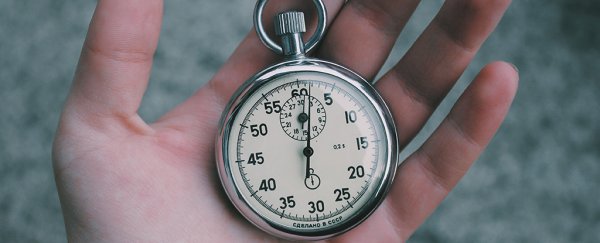Time seems to pass faster or slower depending on the language you speak, new research has revealed, because of the way your native tongue speaks about time.
In English, you might talk about a "long" day, whereas in Greek, you might talk about a "full" day – and those slight variations seem to alter our perceptions of passing time, scientists say.
A team from Stellenbosch University in South Africa and the University of Lancaster in the UK say their work also shows how bilingualism encourages the brain to think in new ways.
"Language can creep into our perception and basically make us experience time in a very language-specific way," one member of the team, Panos Athanasopoulos from Lancaster University, told Kelly Kasulis at Mic.
In one experiment, a computer animation of a slowly growing line was shown to 40 Spanish speakers and 40 Swedish speakers. All the animations lasted 3 seconds, but the line didn't always grow to the same length.
The researchers expected that because Swedes talk about time in terms of distance, they would find it harder to accurately estimate how much time had passed – and they were right.
Meanwhile the Spanish speakers, who refer to time in terms of volume (as in a "small" break rather than a "short" break), were much better at realising that the same 3 seconds had elapsed, no matter how far the line grew.
"The Swedish speakers tend to think that the line that grows longer in distance, takes longer," one of the researchers, linguist Emanuel Bylund from Stellenbosch University, explained to Popular Science.
"Spanish speakers aren't tricked by that. They seem to think that it doesn't matter how much the line grows in distance, it still takes the same time for it to grow."
In another experiment, participants were shown animations of a jug slowly being filled up: the length of the animation was fixed, but the jug filled up by different amounts.
Sure enough, this time it was the Spanish speakers who had more trouble estimating the passage of time.
Interestingly, when the spoken prompts in a particular language were taken away, the volunteers were much better at judging time, as if being asked out loud how much time had passed triggered something in the brain.
To gain more insight into what was happening, 74 bilingual speakers of both Spanish and Swedish were also recruited, and shown similar animations.
The end results were the same: when instructed in Swedish, the volunteers were more easily fooled by the line animations, and when instructed in Spanish, it was the jug animations that interfered with their perceptions of time.
We should note that the variation wasn't huge: the researchers say only "difficult discriminations" were affected by language, when the line lengths weren't particularly long or short, or when the jug wasn't particularly full or empty.
So what's going on here? The team suspects that if we've grown up with a language where a greater length means more time ("a long day"), then our brains automatically assume a longer line needs more time to be drawn.
"We're guessing that it's an experiential bias related to the fact that when we move through space, the longer the distance we move, the longer it takes," says Bylund.
"Even babies who don't yet master language seem to have an association between physical length and temporal length. It might be something innate and it might be something that we acquire as experience as we move through space."
It also offers evidence that speaking more than one language upgrades certain sections of the brain – in this case, enabling us to think of time in two different ways.
"By learning a new language, you suddenly become attuned to perceptual dimensions that you weren't aware of before," explains Athanasopoulos.
Athanasopoulos adds that the way bilinguals seemed to switch between two ways of thinking shows the deep impact language has on our brains.
"Language can creep into our most basic senses, including our emotions, our visual perception, and now it turns out, our sense of time," he says.
The research has been published in the Journal of Experimental Psychology: General.
